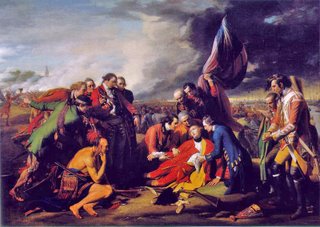Plains of Abraham
 The Battle of the Plains of Abraham, fought September 13, 1759, was a decisive battle of the North American theatre of the Seven Years' War (a theatre known in the United States as the French and Indian War). It was fought on a plateau just outside the city walls of Quebec City in New France, on the land of Abraham Martin dit L'Écossais. Combat lasted only 30 minutes, ending a three-month siege of Quebec City.
The Battle of the Plains of Abraham, fought September 13, 1759, was a decisive battle of the North American theatre of the Seven Years' War (a theatre known in the United States as the French and Indian War). It was fought on a plateau just outside the city walls of Quebec City in New France, on the land of Abraham Martin dit L'Écossais. Combat lasted only 30 minutes, ending a three-month siege of Quebec City."...In order to cover the entire width of the plateau east of the town, Wolfe had set his ranks two-men deep. Unknown to Montcalm, the 1,500 elite troops under his faithful subordinate Louis-Antoine de Bougainville, who had been successfully guarding the northern shoreline up-river from Québec all summer long, had frantically rallied and were soon to arrive just east of the battlefield on the British rear. Uncharacteristically however, the usually careful and methodical Montcalm did not wait. In Montcalm's initial assault his troops fired at 400 metres, having little effect on the British troops. General Wolfe however was struck by several musket balls, one in the chest. He died as the battle was ending, the British victorious. The French were quickly turned back with horrible casualties as the British fired at close range, having waited until only about 40 metres separated the lines to fire and having loaded two balls in each musket, an attack which was described as "The most beautiful volley in the history of warfare". Compounding the British blow was the chaos that ensued in the French ranks as the ducking of militiamen caused regular troops to perceive losses as being far greater than they actually were. Subsequent charges were disorganised and easily picked off by the British; the contingent of Highlanders, leading a bayonet and sword charge, proved especially ruthless on the routed French. They were, however, repulsed by significant fire given by the Indian and Canadian Militia forces in the trees on the British flank. It was these forces who inflicted the majority of the British casualties. Montcalm ordered a retreat back into the city, during which he too was fatally wounded. He staggered through the gates of Quebec in obvious pain, but is reputed to have assured onlookers that the wound was nothing. He died early the next morning..."
<< Home